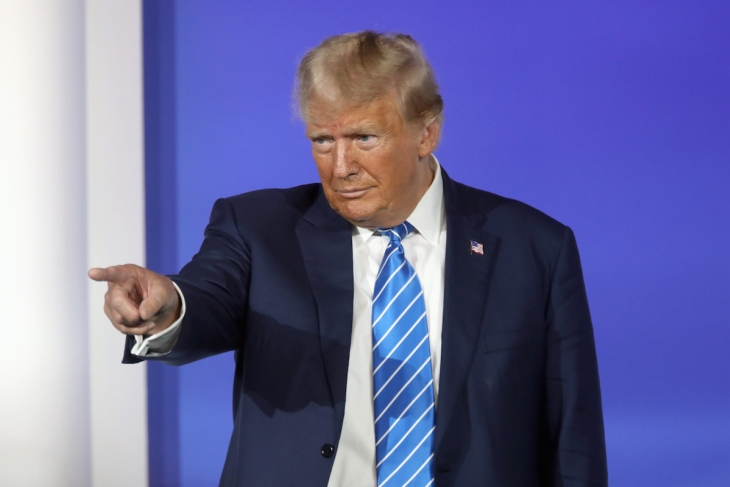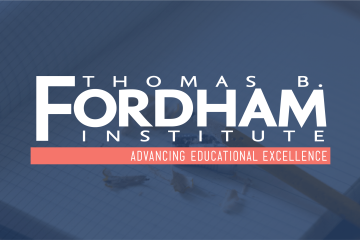November’s all-but-settled presidential rematch bears many of the trappings of 2020, except that Donald Trump will pick a new running mate. Who will it be? There are dozens of possibilities, though he has sometimes signaled an interest in selecting a woman. Let’s take that as a given, then match it with the Washington Post’s top prospects, and look at five that might fit the bill to speculate on what each might mean for education.
Sure, it’s a parlor game, as policy comes from the Oval Office. But it’s never pointless to scrutinize the VP selection, as it can have considerable effects on the election (think Sarah Palin in 2008). Such scrutiny is further warranted because of both Trump’s and Biden’s ages (Trump will be seventy-eight years old on January 20, 2025). Now to the shortlist:
1. Rep. Elise Stefanik (NY): Few embody the complete transformation from moderate to MAGA as completely as Stefanik does. She went viral for her contentious exchanges with three prominent university presidents during December’s congressional hearings on campus antisemitism. On K–12, Stefanik takes credit for helping to get ESSA signed into law, and has been supportive of a parents’ bill of rights and critical of Democrats who oppose it, berating them as “domestic terrorists.” In her home state of New York, she sounded off on the decision to ban the use of Native American mascots or logos in schools, calling it the result of the state’s “woke” department of education.
2. Gov. Sarah Huckabee Sanders (AR): Of all the women in the GOP veepstakes, none has a more public—if recent—record on education. Trump’s former White House press secretary, Governor Sanders spearheaded the passage of the Arkansas LEARNS Act, an omnibus piece of legislation that covers everything from expanding school choice and improving literacy to using test scores to drive interventions and restructuring teacher compensation. Adjusted for cost of living, Arkansas now has the highest starting teacher salary in the nation. For her part, Sanders described the law as “the largest overhaul of the state's education system in Arkansas history.” At the same time, the act’s “indoctrination ban” continues to stir up litigation and controversy.
3. Former Gov. Nikki Haley (SC): Even after dropping out, Haley nonetheless won a decent chunk of the vote in the Pennsylvania primary last month. While she was in the race, her education platform called for shrinking (rather than eliminating) the U.S. Department of Education and establishing a national voucher program. Somewhat bizarrely, she also called for schools to be run more like airports. When she was governor of South Carolina, Haley was an outspoken opponent of the Common Core, while pushing through a reform package to improve reading and technology access.
Haley seems the least likely among this group to get The Donald’s nod, but adding her to the ticket could keep some of her voters from pulling the lever for Biden in an election that’s expected to be tight.
4. Gov. Kristi Noem (SD): If federal education policy is to undergo a MAGA makeover, the governor of the Mount Rushmore State would be right out of central casting. She has vowed to defeat “ascendant anti-Americanism” in schools and signed an executive order to restrict “political indoctrination” in classrooms. Noem has also won praise (and intense controversy) for revamping the state’s (previously very meager) social studies standards, and has reportedly increased K–12 funding by more than 26 percent since taking office in 2019.
5. Kari Lake (AZ): A native of Iowa, Lake is the youngest of nine children and daughter of a public school teacher. Arizona’s GOP senate candidate has an education platform with three planks: (1) eliminating annual state testing, (2) national vouchers for high school graduates to pursue CTE training, and (3) reducing federal bureaucracy. During her unsuccessful gubernatorial bid in 2022, Lake said she wanted to put cameras in classrooms to monitor teachers—likening the idea to police body cams—and for schools to adopt a “patriotic curriculum” consistent with Trump’s call for “patriotic education.”
—
To the extent ed policy was even on his radar, the former president largely focused on school choice and some reining in of the federal Office for Civil Rights during his first term, but showed little interest in student achievement. The Heritage Foundation has provided a more detailed look at what the ed agenda might entail this time around. Predictably, this includes abolishing the U.S. Department of Education and creating multiple forms of school choice, but it also calls for new policy priorities like “prohibiting compelled speech” and adding “family structure” to the categories by which NAEP data are disaggregated. The question is if any of these women appears likely to do anything different if they were to find themselves in the hot seat.
There’s also the question of whether any of them adds to the ticket anything that is apt to appeal to voters on education grounds. Sanders might be suitable here, but it’s slim pickings. While she brings more to the table on schooling, everyone on this list is more motivated by politics than by pedagogy. What’s more, with obeisance as the primary selection criteria, Trump isn’t looking for a heady policy partner. Indeed, if he returns, Trump’s VP will be charged with genuflection, not education.




